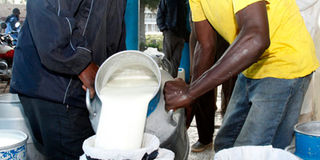Milk prices expected to drop as rainy season starts

Men pour milk in a can recently. According to experts, milk prices will reduce due to the starting rainy season. PhOTO BY DOMINIC BUKENYA
What you need to know:
Although milk prices will obviously drop, it may take a while before consumers begin to feel the benefit of the wet season in terms of reduced price, Ismail Musa Ladu writes.
With the rainy season steadily taking shape, it will not be long before the prices of milk and related products begin to drop, dairy industry players have said.
The country’s agricultural survival, including dairy farming, heavily depends on seasonal rainfalls.
Therefore, the beginning of the wet season signifies not only abundance in terms of food and fodder production, but also an expected “relief” on the pocket/wallet of the consumer. Currently, the farm gate price per litre of milk is trading at between Shs1,100 and Shs1,200. A litre of unprocessed milk is being sold at either Shs1,600 0r Shs1,800. A litre of processed milk is going for either Shs2,800 or Shs3,000, depending on the brand.
“Like all other agricultural commodities elsewhere, when there is a bumper harvest that means there will be sufficient supply. So with enough rain, there will be enough milk supply and therefore, the price of milk will reduce,” the executive director, Dairy Development Authority, Dr Jolly Zaribwende, said.
She continued: “It is no brainer that during bumper harvest, even for commodities such as coffee, the price goes down. So it is not any different with milk.”
Mr Rinus van Klinken, the project Manager of Dairy Enterprise Project, said it emerged that there are two major dynamics that contribute to the prices of the white gold milk.
“Prices of milk go up during dry season and only begins to drop when the rainy season starts. And for that, the two seasons largely explains why the price of milk is what it is,” he said.
According to Mr Klinken, there has since emerged a third element in the mix, which could be decisive on whether the prices of the “white gold” goes down or remain at its current rate or even increase.
“The export of milk to Kenya as a result of shortage will have an influence on prices of milk irrespective of the wet season,” he told Prosper Magazine last week.
“Most of the milk produced could end up in the neighbouring country unless the situation there gets under control. If not what is produced here will be exported to Kenya and as a result, the effect of the rain season on prices may not be felt,” he said.




